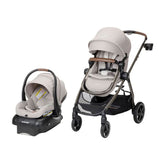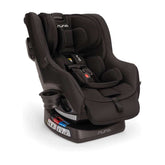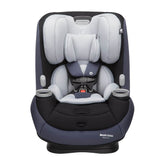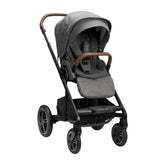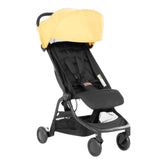When Do Babies Usually Start Teething? What You Need to Know

Updated 7 Jan 2025
Seeing your sweet little one reach those important developmental milestones is one of the most rewarding parts of being a parent – their first laugh, their first word, and taking their first step. Sometimes, though, milestones can be a little bittersweet and painful for both of you. That’s especially true when it comes to teething. Even though it’s a perfectly normal part of their development, the emergence of those pearly whites is often accompanied by a little fussiness, a few tears, and often some restless nights. Let’s take a closer look at when babies start teething and what are the symptoms.
What Are the Symptoms of Teething?
For very young infants, the appearance of those first few teeth may be a relatively painless process. You might not even know they’re teething until you spot that tiny white bump on their jaw. Older infants, however, tend to experience more discomfort. Normal teething symptoms may include any of the following:
- Fussiness
- Trouble sleeping
- Irritability
- Loss of appetite
- Drooling more than usual
Even though your baby may have physical discomfort, teething doesn’t make them ill. It’s important to note that sometimes a baby may simultaneously experience other symptoms that are not normal signs of teething, including:
- Fever
- Diarrhea or vomiting
- Rash
- Productive cough
If your infant has any of these symptoms while teething and continues to be cranky and uncomfortable, they could be signs of an infection. Consult with your pediatrician.
Parents who are breastfeeding or chestfeeding their infants may also notice other changes. For instance, your baby may latch differently because of gum discomfort. You may also notice your infant gnawing or biting down on your breasts just prior to a tooth emerging. Nursing is comforting for infants so they may want to feed more while teething to help soothe the pain.
When Do Babies Start Getting Teeth?
Infants are born with all 20 primary teeth already in place within their jaws. For many babies, you can expect to see the arrival of that first tooth somewhere between 4 and 7 months. That said, the “normal” range is pretty wide and genetics play a big part in the timing. If your child is on the earlier or later end of that range, you can always check in with your pediatrician.
Typically, the two bottom teeth arrive first, followed by the four upper teeth. The rest of your child’s primary teeth will come in gradually, often two at a time, on each side of the mouth. Most will have fully emerged by 3 years of age. At that point, children normally have 10 top teeth and 10 bottom teeth. You can view a full-mouth chart from the American Dental Association that shows when primary teeth typically appear.
Though you may not have thought it possible, some infants are even born with teeth! Referred to as “natal teeth” or “neonatal teeth,” it’s a rare occurrence, varying from 1:6000 to 1:800 cases, occurring in general with incidences of two or three teeth, according to research from the National Institutes of Health.
How Do I Soothe a Teething Baby?
You can try relieving your baby's teething discomfort with these tried and true remedies:
- Apply pressure. Pressure can ease teething discomfort. Massaging the sore part of their gums with a clean finger can provide relief. A cold, solid-rubber teether or even a frozen washcloth to chew on can be soothing.
- Pain relievers. Doctors advise starting with just one dose of acetaminophen or ibuprofen to soothe a fussy teething baby. Also, check the Food and Drug Administration’s website for information about the safety of children’s medications. If it gets to the point where one dose isn’t enough, consult your pediatrician before doing serial dosing.
- Nursing. Breastfeeding can be a wonderful way of soothing your fussy teething baby. Your little one may ask to feed more often, possibly for very short intervals each time. If you're happy to feed them as often as they want, it can really help both of you to get through this tricky time.
- Offer cold foods. If your little one is already eating solids, try offering something cold, like a chilled slice of cucumber. You could also buy a self-feeding teether and put frozen fruit in it. Use caution, however, as this could be a choking hazard.

What Treatments to Avoid for Teething Discomfort
It’s also important to note there are a number of treatments ( even “natural” ones) that may actually harm your baby and should be avoided.
- Don’t give a baby aspirin or massage it into the gums.
- Don’t rub alcohol on the child’s gums.
- Don’t put completely frozen objects directly on the gums.
- Avoid allowing your baby to chew on hard plastic toys. This can negatively impact their oral health as well as become a choking hazard.
- Avoid amber necklaces and teething beads. Most homeopathic practitioners (along with several major health organizations) now recommend against the use of the jewelry, saying that the risk of choking on one of the beads is too great to ignore and outweighs any potential benefits.
- Avoid giving your child topical medications containing lidocaine or benzocaine. No studies have proven the long-term benefit of these products, and the effects last are don't last long. Meanwhile, your baby is ingesting it and getting high levels of the drug into their bloodstream.
- Doctors suggest using similar caution (or altogether avoidance) when it comes to herbal remedies. In certain teething tablets, a toxic substance “far exceeding the amount claimed on the label” was discovered during lab testing. Remember, herbal medications are still medications that must be metabolized by the liver and kidneys. The long-term side effects of these herbal remedies are still unknown, so there is a risk.
How Do I Care for My Baby’s New Teeth?
You’ll want to start caring for those delicate teeth as soon as they make their first appearance. The American Dental Association recommends using a soft, gentle toothbrush with a tiny dab of fluoride toothpaste (an amount the size of a grain of rice) once in the morning and once before bed. This helps prevent decay from the natural sugars in breast milk, formula, and juice that stay on teeth and wear down the enamel. Once your baby has two teeth that touch, use a strand of dental floss to clean between them. This helps clear leftover food residue between teeth and under gums.

FridaBaby Grow-With-Me Training Toothbrush Set
The Bottom Line on When Teething Starts
If you’re a parent wondering “When do babies start teething?” and are anxiously awaiting the arrival of that first pearly white, take heart. There’s a broad range of perfectly normal when it comes to teething. Regardless of when that first tooth comes in, most kids will have all of their teeth by the time they’re three years old. If you’re concerned your baby is behind or ahead of schedule, speak with your pediatrician. It’s also a good idea to schedule your baby’s first visit to a pediatric dentist by age one, as recommended by the American Academy of Pediatric Dentistry. Once teething has begun, be sure to carefully clean the area twice daily. It won’t be long before you’ll be teaching your little one how to brush their own teeth!
Disclaimer: The information on our site is NOT medical advice for any specific person or condition. It is only meant as general information. Please contact your health provider if you have any medical questions or concerns about your child or yourself.

